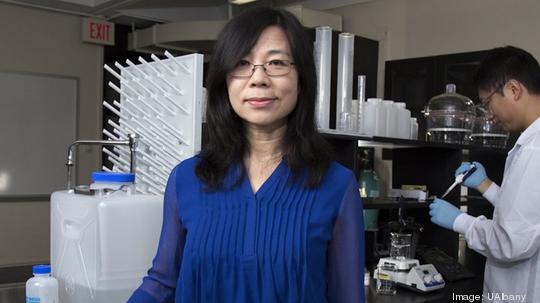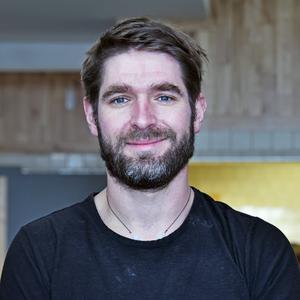
It can take years for startups to commercialize new technology, especially new materials for the medical and aerospace industries. No matter how advanced final products become, they all have to start somewhere. It’s usually as discoveries, oftentimes by accident, inside academic research labs.
Labs inside the Capital Region’s several research colleges are birthplaces of numerous startups at various levels of development and commercialization.
Below is an overview of three early startups working on potentially industry-changing ideas. All three are based at the University at Albany, and they each participated in the most recent SUNY Startup Summer School program.
Regenerative Engineering
Yanna Liang is leading a startup at UAlbany that’s developing technology to convert organic wastewater sludge into usable products, such as biofill, jet fuel replacements and chemicals.
Liang, a UAlbany professor and chair of the university’s environmental and sustainable engineering program, and her team have been working to determine the best focus to take for commercialization.
"There are lots of options we can pursue, but we're trying to identify which options and approach is most efficient and cost effective, and also environmentally responsible,” Liang said.
Liang said the team has been testing options in the lab so far, and larger-scale testing is needed next to better understand overall cost benefits and environmental impact.
"We have been working on the lab-scale test. We have very promising results, but to move onto commercialization, we really needed to do the pilot scale test."
The startup, called Regenerative Engineering, is a result of a $3.4 million consortium led by UAlbany that includes the University of Michigan, Princeton University and the Argonne National Laboratory located outside of Chicago. The U.S. Department of Energy contributed $2.7 million toward the research.
SFluor
Tatyana Tarasevich, a UAlbany doctoral student in chemistry, started SFluor to sell a new heat-resistant polymer that hardens under regular light and is three time stronger than similar types.
Tarasevich discovered the polymer during her graduate research in the lab of John Welch, a UAlbany professor and chair of chemistry.
Because the polymer dries under regular light, it negates the need for expensive lighting setups or chemicals that are traditionally needed, Tarasevich said.
"The beauty of this compound that we made is that it's green chemistry," she said. “Take a light bulb from your house, shine upon it, and it goes.”
The startup is exploring exactly which product approach to take for commercialization, she said. The main focus right now is for the aerospace and aviation industry. The material could also be added into car paint, making the coat harder and more chip resistant. She’s also considered its use in the semiconductor industry.
"Through talking with different sectors of the market ... there is a hole to fill, in essence, because in the airplane industry, there is a drive to move away from metals,” Tarasevich said. “The industry itself is very hesitant to change unless you bring something that they don't have. The hole that we are trying to fill is the environmentally friendly and robust.”
Besides the Summer School program, Tarasevich recently participated in the Blackstone LaunchPad program for young entrepreneurs.
Early Alzheimer’s Diagnostics
Alex Lednev is co-founder and CEO of Early Alzheimer’s Diagnostics, a UAlbany spinoff focused on commercializing technology meant to screen for Alzheimer’s disease through saliva analysis.
The technology can detect the disease at advanced and very early stages, according to Igor Lednev, the UAlbany professor of chemistry whose lab is where the technology is being developed. Alex Lednev is the son of Igor Lednev.
While there is no cure for Alzheimer’s, there are treatments to delay its development but they typically have significant side effects, which is why early diagnosis is so important.
The technology is based on machine learning — a type of artificial intelligence — and Raman spectroscopy, a technique that uses light to analyze chemicals in a nondestructive manner.
Igor Lednev is using Raman spectroscopy in the development of technology for his own startup, SupraMEtric, a system meant to help law enforcement more easily determine the origin of biological stains.



